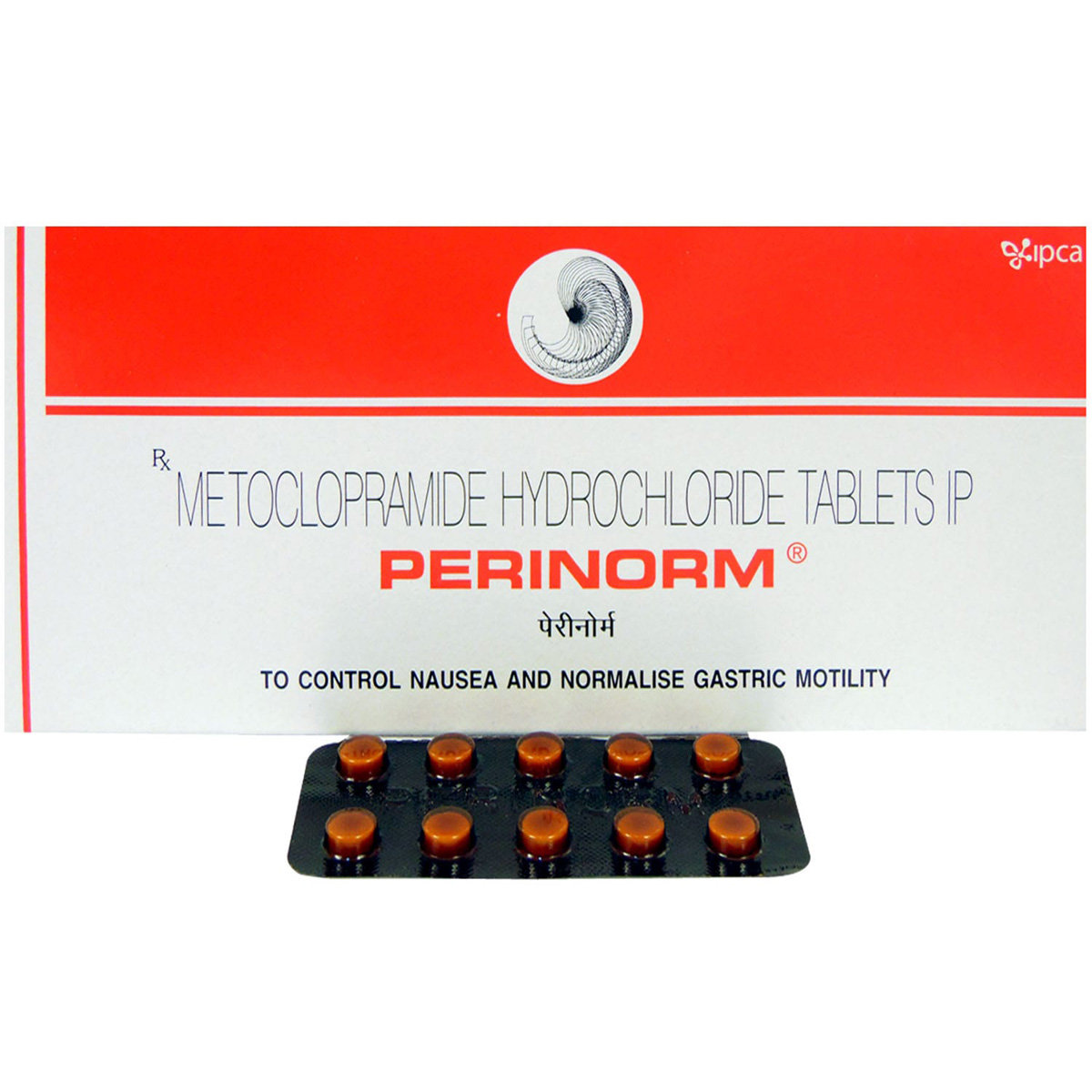Eurometop 10mg Tablet


MRP ₹14.5
(Inclusive of all Taxes)
₹2.2 Cashback (15%)
Provide Delivery Location
Online payment accepted
 Prescription drug
Prescription drugWhats That
Composition :
Manufacturer/Marketer :
Consume Type :
Return Policy :
About Eurometop 10mg Tablet
Eurometop 10mg Tablet belongs to a group of medicines called anti-emetics and prokinetic agents used to prevent nausea and vomiting caused by chemotherapy, radiotherapy, and which might occur after migraine. Additionally, Eurometop 10mg Tablet is also used to treat gastro-oesophageal reflux disease (GERD), diabetic gastroparesis (delayed gastric emptying in people with diabetes), heartburn, ulcers and sores in the oesophagus.
Eurometop 10mg Tablet contains ‘metoclopramide’ that works by increasing the motility of the upper gastrointestinal tract; this allows faster transit of food and reduces the symptoms of GERD and gastric emptying. It also works on the part of the brain that controls vomiting, thereby helps in preventing nausea and vomiting.
In some cases, Eurometop 10mg Tablet may cause common side-effects such as restlessness, fatigue, drowsiness, diarrhoea, weakness, and lassitude (lack of energy). Most of these side effects do not require medical attention and will resolve gradually over time. However, you are advised to talk to your doctor if the side effects persist or worsen.
Do not take Eurometop 10mg Tablet for more than 3 months as it might increase the risk of tardive dyskinesia (movement disorder). Consult your doctor before taking Eurometop 10mg Tablet if you are pregnant or breastfeeding. Eurometop 10mg Tablet may cause drowsiness and dizziness, so avoid driving until you know how Eurometop 10mg Tablet affects you. Avoid consuming alcohol along with Eurometop 10mg Tablet as it could lead to increased drowsiness. Keep your doctor informed about your health condition and medications to rule out any interactions.
Uses of Eurometop 10mg Tablet
Directions for Use
Key Benefits
Eurometop 10mg Tablet belongs to a group of medicines called anti-emetics and prokinetic agents used to prevent nausea and vomiting caused by chemotherapy, radiotherapy, and which might occur after migraine. Additionally, Eurometop 10mg Tablet is also used to treat gastro-oesophageal reflux disease (GERD), diabetic gastroparesis (delayed gastric emptying in people with diabetes), heartburn, ulcers and sores in the oesophagus. Eurometop 10mg Tablet contains ‘metoclopramide’ that works by increasing the motility of the upper gastrointestinal tract; this allows faster transit of food and reduces the symptoms of GERD and gastric emptying. It also affects the dopamine receptor in the brain and gut, thereby helps in preventing nausea and vomiting.
Storage
- Stretching and walking are examples of mild exercises that can improve mobility and reduce muscle stiffness.
- Improving posture, mobility, and muscle coordination through physical therapy can help manage slowness or stiffness.
- Maintain healthy weight and advance general health depend on eating a balanced diet.
- Reducing symptoms like tremors or muscle spasms requires adequate sleep and rest.
- Rest well; get enough sleep.
- Eat a balanced diet and drink enough water.
- Manage stress with yoga and meditation.
- Limit alcohol and caffeine.
- Physical activities like walking or jogging might help boost energy and make you feel less tired.
- Restlessness is related to mental health and needs medical attention if it's severe.
- Regular practice of meditation and yoga can help calm your mind. This can reduce restlessness.
- Prevent smoking as it can impact your calmness of body and mind.
- Talk to your friends and family about restlessness, who can provide a solution for why you feel restless.
- Get sufficient sleep for a minimum of 6-7 hours to reduce restlessness.
- Avoid driving or operating machinery or activities that require high focus until you know how the medication affects you.
- Maintain a fixed sleeping schedule, create a relaxing bedtime routine and ensure your sleeping space is comfortable to maximize your sleep quality.
- Limit alcohol and caffeine as these may worsen drowsiness and disturb sleep patterns.
- Drink plenty of water as it helps with alertness and keeps you hydrated and for overall well-being.
- Moderate physical activity can improve energy levels, but avoid intense workouts right before bedtime.
- Hydrate your body: Drink enough water to prevent dehydration and headaches.
- Calm Your Mind: Deep breathing and meditation can help you relax and relieve stress.
- Rest and Recharge: Sleep for 7-8 hours to reduce headache triggers.
- Take rest: lie down in a quiet, dark environment.
- Cold or warm compresses can help reduce tension.
- Stay Upright: Maintain good posture to keep symptoms from getting worse.
- To treat headaches naturally, try acupuncture or massage therapy.
- Over-the-counter pain relievers include acetaminophen and ibuprofen.
- Prescription Assistance: Speak with your doctor about more substantial drug alternatives.
- Severe Headaches: Seek emergency medical assistance for sudden, severe headaches.
- Frequent Headaches: If you get reoccurring headaches, consult your doctor.
- Headaches with Symptoms: Seek medical attention if your headaches include fever, disorientation, or weakness.
- Inform your doctor about dizziness symptoms. They may adjust your medication regimen or prescribe additional medications to manage symptoms.
- Follow your doctor's instructions for taking medication, and take it at the same time every day to minimize dizziness.
- When standing up, do so slowly and carefully to avoid sudden dizziness.
- Avoid making sudden movements, such as turning or bending quickly, which can exacerbate dizziness.
- Drink plenty of water throughout the day to stay hydrated and help alleviate dizziness symptoms.
- If you're feeling dizzy, sit or lie down and rest until the dizziness passes.
- Track when dizziness occurs and any factors that may trigger it, and share this information with your doctor to help manage symptoms.
- Avoid driving or operating machinery or activities that require high focus until you know how the medication affects you.
- Maintain a fixed sleeping schedule, create a relaxing bedtime routine and ensure your sleeping space is comfortable to maximize your sleep quality.
- Limit alcohol and caffeine as these may worsen drowsiness and disturb sleep patterns.
- Drink plenty of water as it helps with alertness and keeps you hydrated and for overall well-being.
- Moderate physical activity can improve energy levels, but avoid intense workouts right before bedtime.
Drug Warnings
Do not take Eurometop 10mg Tablet if you are allergic to any of its contents; if you have bleeding or obstruction in the stomach, tardive dyskinesia (movement disorder), pheochromocytoma (tumour in the adrenal glands), or epilepsy. Talk to your doctor before taking Eurometop 10mg Tablet if you have heart problems, diabetes, depression, high blood pressure, breast cancer, seizures, liver or kidney problems, Parkinson’s disease, methaemoglobinaemia; if you are taking levodopa or if you have gastrointestinal surgery in the last 3-4days. Do not take Eurometop 10mg Tablet for more than three months as it might increase the risk of tardive dyskinesia; the risk increases if you are older, especially if you are an older woman or if you have diabetes. Consult your doctor immediately if you cannot stop or control movements like shaking your arms and legs, blinking and moving your eyes, sticking out the tongue, frowning, lip-smacking, chewing, or puckering up the mouth.
Drug-Drug Interactions
Drug-Drug Interactions
Login/Sign Up
The combination of Lurasidone and Eurometop 10mg Tablet may result in significantly increased Lurasidone blood levels. This may raise the possibility of undesirable consequences such as Parkinson's disease. (It is a neurological condition that causes uncontrollable movements)and Tardive dyskinesia (uncontrollable movements, particularly of the lower face).
How to manage the interaction:
Lurasidone and Eurometop 10mg Tablet is not recommended, as they may interact, but can be used if a doctor prescribes them. Consult a doctor if you have muscle spasms, or movements that you can't stop or control, such as lip smacking, chewing, puckering, frowning, tongue thrusting, teeth clenching, jaw twitching, jitteriness, restlessness, pacing, and foot tapping. Do not stop taking any medications without visiting a doctor.
Co-administration of Eurometop 10mg Tablet with Aripiprazole can increase the risk of side effects.
How to manage the interaction:
Taking Aripiprazole with Eurometop 10mg Tablet is generally avoided as it can result in an interaction, it can be taken if a doctor has advised it. Do not discontinue any medications without consulting a doctor.
Coadministration of Eurometop 10mg Tablet and prochlorperazine can increase the risk of side effects.
How to manage the interaction:
Taking Eurometop 10mg Tablet with Prochlorperazine together is generally avoided as it can possibly result in an interaction, they can be taken together if advised by your doctor. However, if you experience muscle spasm or movements that you can't stop or control, such as lip smacking, chewing, puckering, frowning or scowling, tongue thrusting, teeth clenching, jaw twitching, blinking, eye rolling, shaking or jerking of arms and legs, tremor, jitteriness, restlessness, pacing, and foot tapping, consult the doctor. Do not stop taking any medications without consulting a doctor.
Co-administration of Eurometop 10mg Tablet with Clozapine can increase the risk of side effects.
How to manage the interaction:
Taking Eurometop 10mg Tablet with Clozapine is generally avoided as it can possibly result in an interaction, it can be taken if your doctor has advised it. Do not discontinue any medications without consulting a doctor.
Co-administration of Eurometop 10mg Tablet with Risperidone can increase the risk of side effects like uncontrolled movement disorder.
How to manage the interaction:
Taking Risperidone with Eurometop 10mg Tablet is not recommended as it can possibly result in an interaction, it can be taken if your doctor has advised it. If you notice any of these symptoms like muscle spasms or movements that you can't stop or control, such as lip smacking, chewing, puckering, frowning or scowling, tongue thrusting, teeth clenching, jaw twitching, blinking, eye-rolling, shaking or jerking of arms and legs, shaking, jitteriness, restlessness, pacing, and foot tapping contact a doctor immediately. Do not stop using any medications without a doctor’s advice.
Coadministration of Eurometop 10mg Tablet with Venlafaxine might raise serotonin hormone levels in the body, affecting the brain and nerve cells. Increased serotonin hormone can lead to side effects.
How to manage the interaction:
Taking Eurometop 10mg Tablet with Venlafaxine together is generally avoided as it can possibly result in an interaction, it can be taken if your doctor has advised it. Do not discontinue any medications without consulting a doctor.
Co-administration of Eurometop 10mg Tablet with Trifluoperazine can increase the risk of side effects like uncontrolled movement disorder.
How to manage the interaction:
Taking Eurometop 10mg Tablet with Trifluoperazine is generally avoided as it can possibly result in an interaction, it can be taken if your doctor has advised it. However, if you experience muscle spasms or movements that you can't stop or control, such as lip smacking, chewing, puckering, frowning or scowling, tongue thrusting, teeth clenching, jaw twitching, blinking, eye-rolling, shaking or jerking of arms and legs, tremor, jitteriness, restlessness, pacing, and foot tapping., contact your doctor immediately. Do not discontinue any medications without consulting a doctor.
Coadministration of Eurometop 10mg Tablet with Trazodone can rarely increase serotonin hormone levels in the body, affecting the brain and nerve cells. Increased serotonin hormone can lead to side effects.
How to manage the interaction:
Taking Eurometop 10mg Tablet with Trazodone is not recommended, but can be taken together if prescribed by a doctor. However, consult a doctor if you experience any symptoms like dizziness, fever, excessive sweating, shivering, blurred vision, muscle stiffness, stomach cramps, nausea, vomiting, or diarrhoea contact your doctor immediately. Do not discontinue any medications without consulting a doctor.
Coadministration of Eurometop 10mg Tablet with quetiapine can increase the risk of side effects like uncontrolled movement disorder.
How to manage the interaction:
Taking Eurometop 10mg Tablet with Quetiapine is generally avoided as it can possibly result in an interaction. They can be taken together if advised by your doctor. However, contact a doctor if you experience any symptoms like muscle spasms or movements that you can't stop or control, such as lip smacking, chewing, teeth clenching, jaw twitching, blinking, eye-rolling, shaking or jerking of arms and legs, tremor, restlessness, pacing, and foot tapping. Do not stop taking any medications without consulting a doctor.
Co-administration of Eurometop 10mg Tablet with Cariprazine can increase the risk of side effects.
How to manage the interaction:
Taking Cariprazine with Eurometop 10mg Tablet is generally avoided, but can be taken together if prescribed by a doctor. However, if you experience muscle spasms or movements that you can't stop or control, such as lip smacking, chewing, puckering, frowning or scowling, tongue thrusting, teeth clenching, jaw twitching, blinking, eye-rolling, shaking or jerking of arms and legs, shaking of hands and legs, jitteriness, restlessness, pacing, and foot tapping, contact a doctor immediately. Do not stop using any medications without talking to a doctor.
Drug-Food Interactions
Drug-Food Interactions
Login/Sign Up
Diet & Lifestyle Advise
- Eat smaller meals more often.
- Drink fluids to stay hydrated.
- Avoid solid foods until vomiting stops.
- Avoid foods that might cause stomach upset.
- Take ample rest. Avoid any activity immediately after eating.
- Consume plain, light foods such as bread and biscuits.
- Avoid food with strong flavours and fried food.
- Ginger tea might help in proper digestion.
Side Effects of Eurometop 10mg Tablet
- Restlessness
- Fatigue
- Drowsiness
- Diarrhoea
- Weakness
- Lassitude (lack of energy)
Habit Forming
Therapeutic Class
All Substitutes & Brand Comparisons
RX
Out of StockDysvon 10mg Tablet
₹6.37
(₹0.57 per unit)
56% CHEAPERRX
Out of StockGastrinorm 10mg Tablet
₹7
(₹0.63 per unit)
51% CHEAPERRX
Out of StockReggi 10mg Tablet
A. Menarini India Pvt Ltd
₹7.04
(₹0.63 per unit)
51% CHEAPER
Product Substitutes
Author Details
We provide you with authentic, trustworthy and relevant information
Drug-Diseases Interactions
Drug-Diseases Interactions
Login/Sign Up
FAQs
Drug-Drug Interactions Checker List
- ASPIRIN
- ACETAMINOPHEN
- DULOXETINE
- DIPHENHYDRAMINE
- ALPRAZOLAM
- PREGABALIN
- LEVODOPA
Special Advise
Your doctor may advise you to regularly get blood tests done to check your blood pigment levels. If Methaemoglobinaemia is observed, treatment with Eurometop 10mg Tablet should be stopped immediately and permanently. Methaemoglobinaemia is a blood condition in which the haemoglobin iron is in the oxidized state and cannot reversibly bind to oxygen.
Disease/Condition Glossary
Nausea/Vomiting: Nausea is an uneasy feeling in which the person feels an urge to vomit, whereas vomiting is an uncontrollable reflex that expels the contents of the stomach through the mouth. Nausea and vomiting may occur separately or together. The common causes include motion sickness, emotional stress, indigestion, food poisoning, high fever or overeating. Nausea/vomiting might also occur as an unpleasant effect of therapy, such as chemotherapy and radiation therapy.
Gastroesophageal reflux disease (GERD): The stomach is usually protected from acid by a mucous layer. In some cases, due to excess acid production, the mucous layer gets eroded, which leads to complications like GERD, acidity, and peptic ulcers. Gastroesophageal reflux disease (GERD) occurs when stomach acid frequently flows back into the food pipe (oesophagus). This backflow (acid reflux) irritates the food pipe and causes heartburn.
Diabetic gastroparesis: Diabetic gastroparesis is delayed gastric emptying in people with diabetes. Gastroparesis, also called delayed gastric emptying is a condition that occurs when the stomach takes too long to empty the food into the intestine. Symptoms include nausea, vomiting, indigestion, loss of appetite, bloating and heartburn.

Have a query?
Alcohol
Safe if prescribed
Avoid consumption of alcohol while taking Eurometop 10mg Tablet as it may make some side effects worse such as increased sleepiness and drowsiness.
Pregnancy
Consult your doctor
Consult your doctor before taking Eurometop 10mg Tablet if you are pregnant; your doctor will prescribe only if the benefits outweigh the risks.
Breast Feeding
Consult your doctor
Consult your doctor before taking Eurometop 10mg Tablet if you are breastfeeding.
Driving
Safe if prescribed
Eurometop 10mg Tablet may cause dizziness, drowsiness and fatigue. Do not drive or operate machinery until you know how Eurometop 10mg Tablet affects you.
Liver
Consult your doctor
Dose adjustment may be needed. Consult your doctor before taking Eurometop 10mg Tablet if you have a liver impairment or any concerns regarding this.
Kidney
Consult your doctor
Dose adjustment may be needed. Consult your doctor before taking Eurometop 10mg Tablet if you have kidney impairment or any concerns regarding this.
Children
Safe if prescribed
Metoclopramide tablets are not recommended for children due to the risk of tardive dyskinesia, extrapyramidal symptoms as well as risk of methemoglobinemia in neonates. Metoclopramide drops should be given to children only if prescribed by the doctor.







_0.jpg?tr=q-85)

